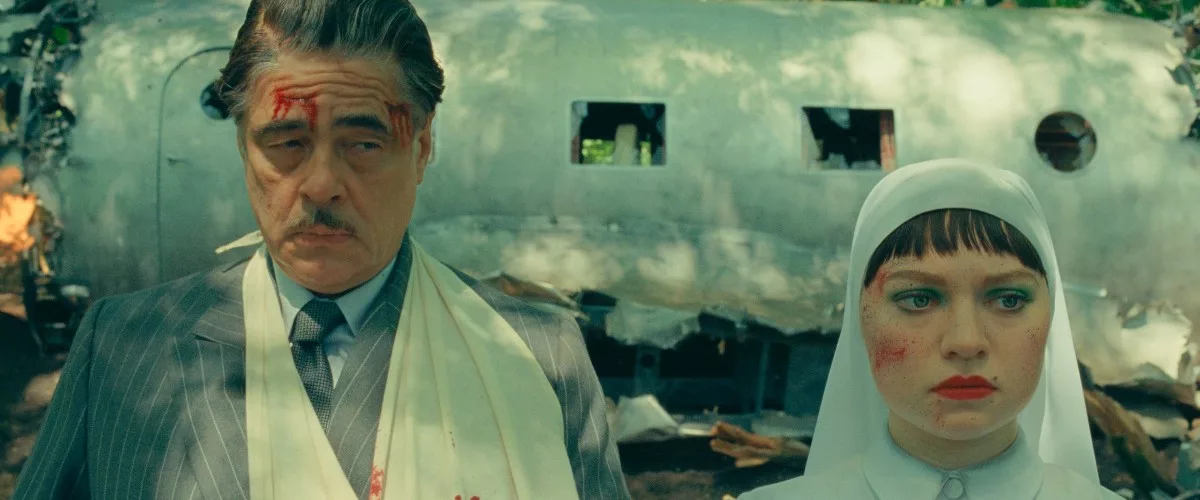Wes Anderson searches for meaning in the biblical and the bureaucratic in his often delightful “The Phoenician Scheme,” a film that feels slighter than the surprisingly heavy “Asteroid City” but hums with the precise craftsmanship we expect from this singular filmmaker. On the surface, the latest from the beloved auteur feels like a lark—it’s one of his flat-out goofiest movies, filled with physical humor and sight gags—but he’s also playing with deeper themes like finding purpose in family instead of business and the way oligarchs can manipulate both. Buoyed by a traditionally spectacular ensemble, “The Phoenician Scheme” feels unlikely to be anyone’s favorite Wes Anderson flick. Still, it’s so easy to like that it’s equally difficult to hate it.
A perfectly deadpan Benicio del Toro plays a puppet master of a businessman named Zsa-zsa Korda, whom we meet as he survives his sixth plane crash in the film’s hysterical opening sequence, one that involves a man blown in two and a pilot ruthlessly fired as he’s ejected from a crashing plane. Someone, or possibly multiple someones, have been trying to kill Korda for a while now, leading him to realize that he needs to protect his empire by naming an heir. He has nine sons, many of them adopted just in case one of the available orphans turns out to be the next Einstein (it’s “playing the odds,” according to Korda). But he’s more interested in preparing his throne for his daughter, a nun named Liesl (Mia Threapleton).
To teach Liesl the ropes and negotiate a massive deal in a way that feels more morally righteous than Korda has previously concerned himself with (no slave labor this time), he goes on a globetrotting mission to secure funding from multiple sources. They include a prince named Farouk (Riz Ahmed), brothers played by Tom Hanks & Bryan Cranston, nightclub owner Marseille Bob (Mathieu Amalric), the American Marty (Jeffrey Wright), his cousin Hilda (Scarlett Johansson) and eventually the memorable Uncle Nubar (Benedict Cumberbatch), who looks like an old Russian Czar who long ago left sanity behind. Even this list of wonderfully cast all-stars barely captures an ensemble that includes Richard Ayoade, Rupert Friend, Hope Davis, Willem Dafoe, and Bill Murray as God. Yes, Herman Blume has finally taken the throne.
With all these actors delivering in the same comic register as we’ve come to expect from Anderson, it’s remarkable how Michael Cera walks away with the film, giving one of my favorite performances in Anderson’s oeuvre and doing his best work to date. Del Toro and Threapleton are excellent, but it’s the “Superbad” star, playing an awkward tutor with a secret, who proves to be one of the best fits of performer and director maybe ever. Cera’s always had a bit of Max Fischer in him, and he nails the rhythms of Anderson’s dialogue, giving a multi-layered performance that’s more complex than it first appears. Let’s just say he gets to do a lot. And show off some karate moves.
After the dense plotting of “The French Dispatch” and the ambition of “Asteroid City,” what’s likely to throw people about “The Phoenician Scheme” is how little they’re going to care about what’s happening. There’s a bit of a murder mystery in the background involving Liesl’s mother, but Anderson is intentionally vague about what Korda’s actually doing and why he’s doing it. It may have the word “Scheme” in the title, but the negotiations between Korda and the eccentric characters he meets feel obtuse, almost to the point that the business double-talk distracts from what the film does well. It’s where it sags in terms of pacing and character. Exactly what does Korda need from Farouk compared to Marseille Bob, and how do his negotiations with them differ? I couldn’t tell you. The plotting often feels like an arbitrarily structured skeleton on which Anderson and co-writer Roman Coppola hang the things that interest them.
And what are those things? Thematically, “The Phoenician Scheme” is something of a redemption story, a tale of a man who has long been one of the most powerful in the world but questions what that has brought him as he faces the end over and over again—every time he dies in an assassination attempt, Anderson cuts to Heaven for some fascinating biblical tableaus, none of which imply it will be easy for Korda to stride through the pearly gates. To see Anderson playing with imagery of religion and the afterlife as he considers the potential repercussions of living a corrupt mortal life feels consistent with his recent work, which is more philosophically urgent than his early stuff. But there are times in “The Phoenician Scheme” when you can almost feel Anderson backing away from these ideas, refusing to take political and personal corruption seriously because he’d rather make a silly comedy. There’s a better version of this film in which Anderson digs his nails deeper into some of these themes. However, it’s not hard to see the messaging in a movie about powerful people who literally play with hand grenades, and adopt children just in case they get a genius in the family tree.
Zsa-zsa Korda claims to have lived his life under two mottos: “Who could lick who, or whom, I guess,” and “If something gets in your way, flatten it.” These are not life principles that are traditionally going to get you into Heaven. “The Phoenician Scheme” is Wes Anderson’s conversation with himself about what it means to be both successful and decent, and an examination of how someone who has flattened everything in his way can see the world three-dimensionally again.
You know, maybe this one isn’t so slight after all.
This review was filed from the premiere at the Cannes Film Festival. It opens on May 30th.




















